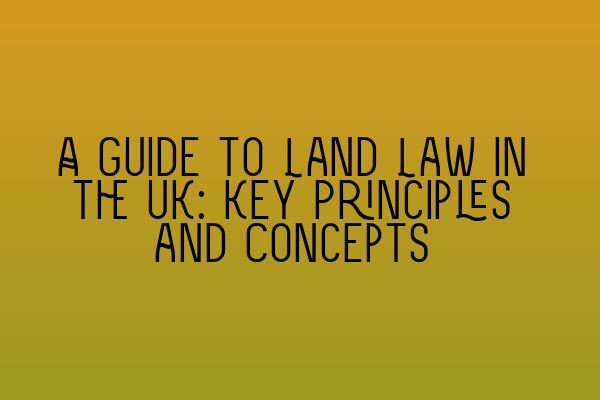A Guide to Land Law in the UK: Key Principles and Concepts
Welcome to SQE Property Law & Land Law, where we provide expert legal advice and services related to all aspects of property law in the UK. In this comprehensive guide, we will explore the key principles and concepts of land law to help you understand the intricacies of this complex area.
1. Introduction to Land Law
Land law is a fundamental branch of UK property law that governs the rights and interests in land. It covers a wide range of legal issues related to the ownership, use, and transfer of land, as well as the rights and obligations that arise from such ownership.
If you’re studying for the SQE 1 exam, our SQE 1 Practice Exam Questions and SQE 1 Practice Mocks FLK1 FLK2 can help you test your knowledge and prepare for the exam.
2. The Concept of Ownership
The concept of ownership in land law is based on the principle of exclusive possession and control. It grants the owner the right to use, enjoy, and dispose of the land, subject to certain restrictions imposed by law.
Ownership rights can be transferred through various means, such as sale, gift, or inheritance. The transfer of ownership requires a valid legal document, usually in the form of a deed.
3. Types of Property Interests
Property interests in land can be categorized into two main types: freehold and leasehold.
Freehold estates give the owner absolute ownership rights over the land, with no time limit. It is the highest form of property interest and grants the owner the right to possess and use the land indefinitely.
On the other hand, leasehold estates grant the tenant the right to possess and use the land for a specific period, as defined in the lease agreement. Leasehold estates are usually subject to rent payments and other obligations to the landlord.
4. Land Registration
Land registration is a crucial aspect of land law in the UK. It provides a reliable and conclusive record of ownership rights and interests in land.
Under the Land Registration Act 2002, all transfers of ownership and certain other property interests must be registered with the Land Registry. Registration offers protection against future claims and ensures transparency in property transactions.
If you’re looking for comprehensive SQE 2 preparation courses, we offer tailored courses to help you excel in the exam. Visit our SQE 2 Preparation Courses page for more information.
5. Easements and Covenants
Easements are rights that one party has over another’s land, such as the right of way or the right to access a neighboring property. Easements are usually created by express agreement or through long usage.
Covenants, on the other hand, are legally binding promises that impose obligations or restrictions on the use of land. They can be positive, requiring the landowner to do something, or restrictive, prohibiting certain actions.
6. Adverse Possession
Adverse possession, also known as squatter’s rights, allows someone who occupies another person’s land without permission to claim ownership after a certain period of time. To successfully claim adverse possession, certain conditions must be met, including exclusive possession and continuous use of the land for a specified period.
Conclusion
Land law plays a crucial role in regulating property rights and interests in the UK. Understanding the key principles and concepts of land law is essential for anyone involved in property transactions or studying for legal exams.
If you’re preparing for the SQE 1 or SQE 2 exams, our SQE 1 Preparation Courses can provide you with the knowledge and skills necessary to succeed. Stay updated with the latest SRA SQE Exam Dates to plan your exam schedule effectively.
For expert legal advice and assistance with property law matters, contact SQE Property Law & Land Law today. Our experienced solicitors are ready to help you navigate the complexities of land law in the UK.
